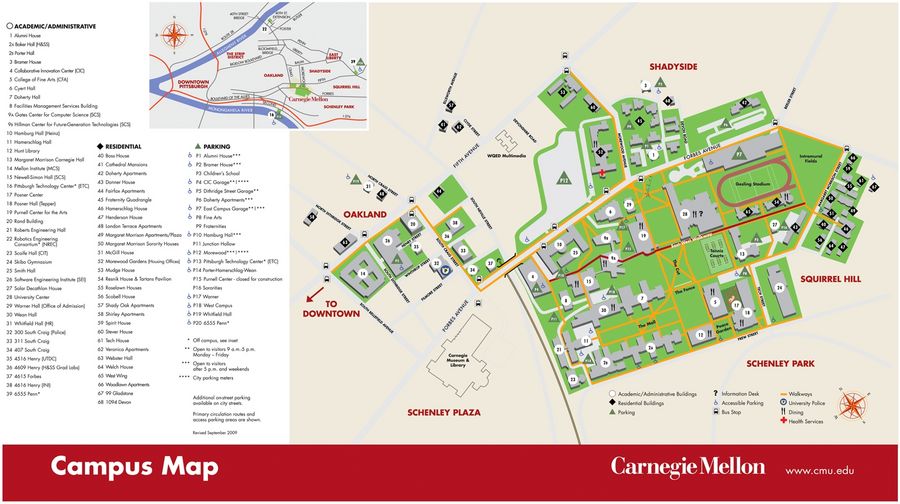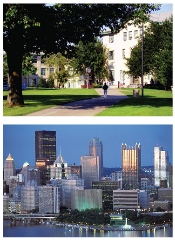Venue
Location
This year's conference will be held on the Carnegie Mellon campus, located at the heart of Oakland, one of Pittsburgh's neighborhoods. On the campus, we will be holding our sessions at the University Center.
The University Center is located on the main part of campus along Forbes Avenue, between the Purnell Center for the Arts and Gesling Stadium. From the East Campus Parking Garage, exit the facility toward the major part of campus (on the opposite side as Beeler Street), and you will see the University Center on your left.
The University Center is marked as number 28 on the campus map below (click on the map to enlarge))
Parking
After arriving on campus, the first place to look for parking is the East Campus Parking Garage, a pay-as-you-park facility. There are entrances at the intersection of Forbes Avenue and Beeler Street and also on the south side of the garage closest to the University Center and Gesling Stadium. The south side entrance can be accessed on Forbes Avenue just past the intersection with Morewood Avenue.
Additional parking is available in other locations throughout campus. For more information, visit the vistor parking information website at http://www.cmu.edu/parking/about/index.html.
About the Venue
CSEE&T2010 sessions will be held at selected rooms at the University Center.
About Carnegie Mellon
Carnegie Mellon University is a global research university with more than 11,000 students, 75,000 active alumni, and 4,000 faculty and staff. Recognized for its world-class arts and technology programs, collaboration across disciplines and innovative leadership in education, Carnegie Mellon is consistently a top-ranked university.
The university began as a small technical school and evolved into what it is today under the guidance of exceptional leadership teams.
Carnegie Mellon consists of seven schools and colleges: Carnegie Institute of Technology, College of Fine Arts, College of Humanities and Social Sciences, Heinz College, Mellon College of Science, School of Computer Science and the Tepper School of Business.
About Pittsburgh
Pittsburgh combines all of the friendly small-town comforts with all the benefits of a big city. Its history as the Steel City is apparent by the grand architectural style of its buildings and in the neighborhoods, but don't make the mistake of believing that it's the smoky, industrial city from a century ago. Presently, Pittsburgh has developed into a nationally recognized financial and technological center. (In fact, the city boasts of more doctoral scientists and engineers per capita than Boston, L.A., or San Francisco). Pittsburgh provides numerous opportunities to engage in all the sights, sounds and good taste of a river city
International visitors find Pittsburgh a refreshingly authentic experience of an American city, free of pretense and filled with countless ethnic influences. One distinguishing characteristic of Pittsburgh is its sense of community and neighborhoods. The city's 88 neighborhoods showcase a wide variety of cultures, ranging from Italian, Greek, Polish, Indian, to Irish.

